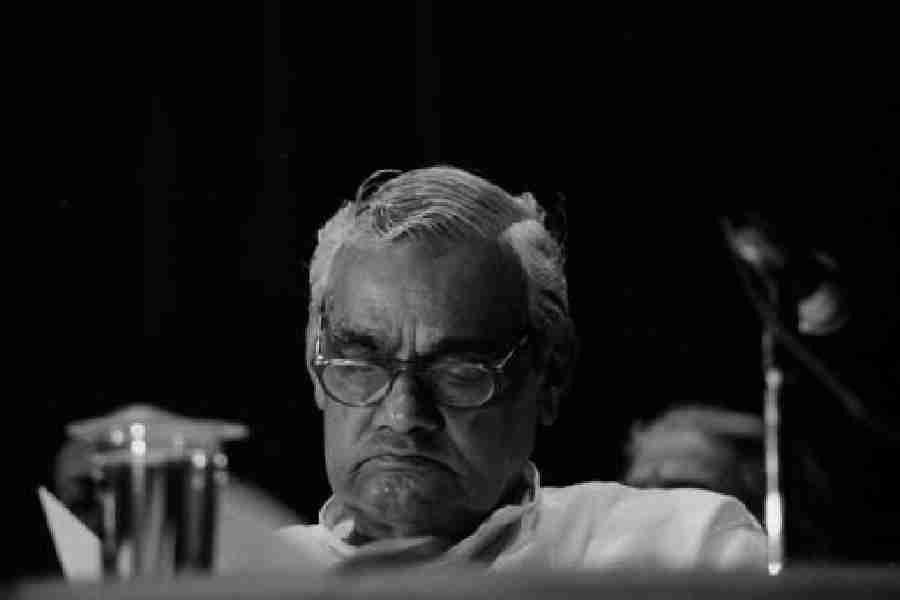The former pracharak of the Rashtriya Swayamsevak Sangh, K.N. Govindacharya, insists that he was misquoted when he called the former prime minister, Atal Bihari Vajpayee, a mukhota (mask) of the Bharatiya Janata Party, but the description stuck — and with good reason. Abhishek Choudhary maps this out meticulously in the first part of his two-volume biography of Vajpayee.
Way before that one word became a synonym of sorts for Vajpayee, the right-wing politician had made a career out of “duality”, which, in turn, helped the sangh parivar spread its footprint. Choudhary traces this back to February 1961 — during the first major post-Partition communal riots in Jabalpur. “For Vajpayee, this was the beginning of a lifelong duality. While he was keen to project a liberal image for his party [Jan Sangh], the RSS-Jan Sangh foot soldiers continued to pursue instrumentalist tactics (such as igniting or fuelling a riot) to maintain their domination and sometimes to benefit from polarization in an election.” Even before this, Vajpayee had managed to create the ‘right-man-in-the-wrong-party’ image. Jawaharlal Nehru, according to Choudhary, began to think of Vajpayee as a “likeable, bright young man in an otherwise regressive party” from 1958. This impression — some would say myth — grew stronger to the extent that Acharya Kriplani declared him a “Nehruvian in Jan Sanghi garb” in 1962 for not demanding a change in premiership during the war with China. These are some of the markers that establish how Vajpayee’s duality was cultivated and institutionalised. More importantly, Choudhary underscores that the doublespeak personified by Vajpayee was also part of the right-wing’s DNA: “In many ways, Vajpayee personified the Jan Sangh’s doublespeak.”
Focusing as the book does on the early part of Vajpayee’s life, it offers many little-known anecdotes, including how his resume was given a makeover to present him as a “prodigy, a self-made man who had chosen to give up an assured career and the fulfilment of conjugal life to save India’s soul” when he was picked to be the Jan Sangh’s candidate for a by-election in 1955. His place of birth was changed from Bateshwar to Gwalior, and he became an M.A. LLB although he had “abandoned his law degree.” Further liberties were taken with his resume for the 1957 general elections by when it was said that he had never stood second throughout his student life. Choudhary’s primary research dug up Vajpayee’s eighth and tenth standards certificates, which show that he scored a “lowly” third division and second division, respectively.
As the title indicates, the book signs off at the point when the Indian Right gets its first taste of office at the Centre with Vajpayee being sworn in as the external affairs minister. While Vajpayee’s comrade-in-arms, L.K. Advani, is mostly credited with the rise of the BJP to where it is now, Choudhary contends with evidence that the former prime minister was equally “critical to the Sangh Parivar’s project of Hinduizing India” from his early avatar as the editor of the Panchjanya where he even played the moral policeman, notwithstanding his reputation of a meat-eating, drink-nursing, bhang-consuming man who sired a daughter while maintaining the façade of a celibate RSS pracharak. “He implored the UP government to prohibit children of sixteen years and below from watching films,’’ after the release of Raj Kapoor’s mega-hit, Barsaat. He even “protested its ‘dirty, vulgar songs’ could still be heard everywhere’’ when the screening was stopped six months after its release. “He feigned shock at a song extolling the heroine’s ‘patli kamar, tirchi nazar’…”
On the day of the protest for cow slaughter ban in November 1966, Vajpayee was on stage when it turned violent but quickly disassociated himself from the call to gherao Parliament in yet another instance of “the oldest Sangh Parivar technique of absolving the organization in case of a disaster.”
Stringing such news-making events with anecdotes, Choudhary has drawn up a detailed assessment of a man who had cultivated an enigmatic aura around him. Choudhary’s biography, complete with all of Vajpayee’s warts, also shines a light on Hindutva politics from its infancy as well as the “Sangh’s strategic employment of secrecy and misinformation”, making it a must read in today’s India.











